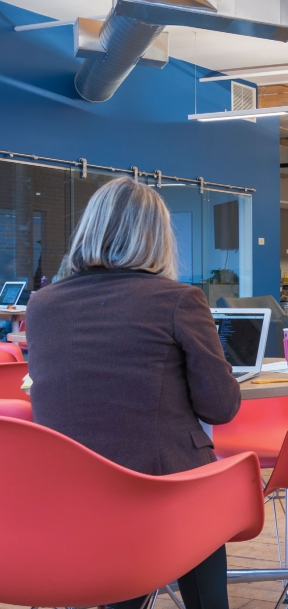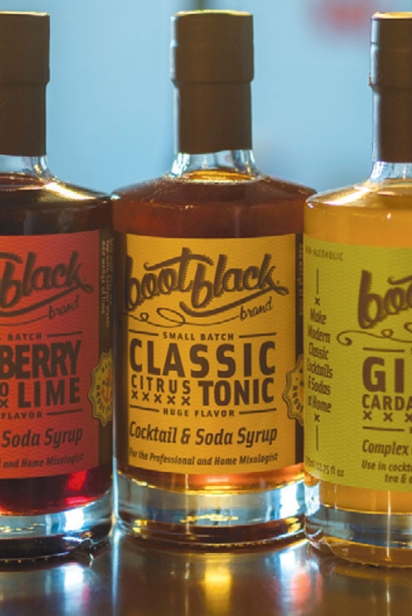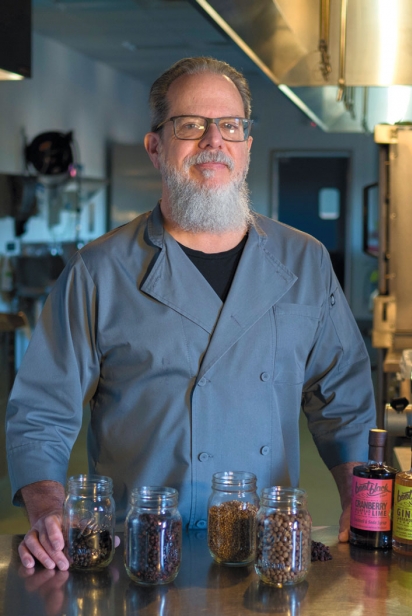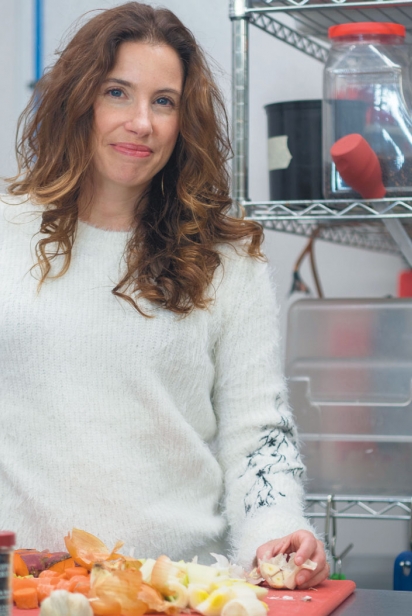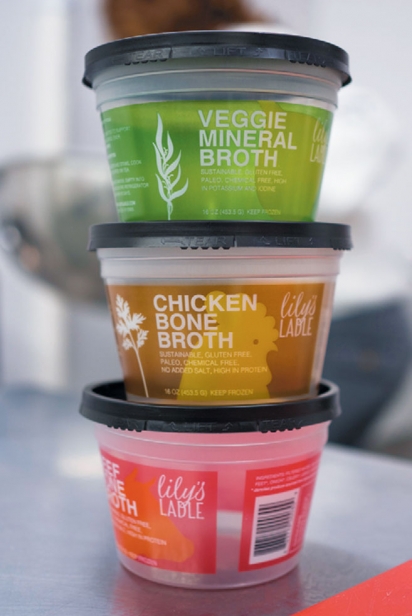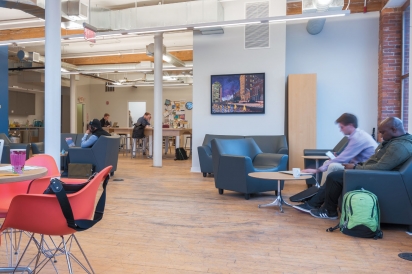Social Enterprise Greenhouse Food Accelerator Program Nurtures Culinary Talents
Lily Scott and Paul Kubiski Dish About Their SEG Experiences, Business Challenges and Progress
What do Rhode Island– made cocktail syrups and bone broths have in common besides their local provenance? After all, one product lurks behind the bar and the other mainly in the kitchen. The common ingredient is the Social Enterprise Greenhouse (SEG) Food Accelerator Program, from which Paul Kubiski, of Bootblack Brand, and Lily Scott, of Lily’s Ladles, graduated in May 2017. Kubiski and Scott, two of the program’s six graduates in 2017, talked with Edible Rhody about what they learned from SEG and how their respective businesses are growing as a result.
“The goal of SEG is to help businesses do well, be profitable and do good; that’s the definition of a social enterprise,” said SEG Food Initiative and Development Director Betsy Santarlasci. A social enterprise business can be a for-profit or nonprofit entity, but those participating in SEG’s accelerator programs, which include one food-themed program annually, must have a sincere commitment to doing good. Every SEG participant has a coach, ideally someone whose skills and background are aligned with the needs and interests of the specific business, to provide guidance and support, said Santarlasci, who served as Scott’s SEG coach.
The 12-week program is a blended model, offering a mix of online learning modules and workshops led by business people and experienced social entrepreneurs, presentations from industry experts, one-on-one coaching with business and community leaders, and access to a network of advisors and the SEG Loan Fund. SEG also hosts quarterly “pitch events” to potential funders, investors and donors at its offices in Providence’s Jewelry District.
Finding production space is a big challenge, said Santarlasci, who was delighted when Scott teamed up with fellow Food Accelerator Program participant Kaylyn Keane, of Lost Arts Cultured Food, to independently locate production space in Cranston. “Lily is very quick. She absorbed the curriculum and advising in a flash and ran with it.”
GRAPHIC DESIGNER CREATES SMALL-BATCH COCKTAIL SYRUPS
“Bootblack Brand was conceived as many great ideas are, while sitting on a barstool with friends,” says Kubiski, whose interest in flavors is rooted in a culinary perspective. “There’s no reason for anyone to eat bad food or drink bad drinks.”
After imbibing a sufficient number of poorly concocted cocktails, Kubiski began “messing around with syrups,” and Bootblack Brand’s simple syrups are the delicious results. While many alcohol-infused ideas die on the barroom floor, Kubiski carried his vision into product development.
Bootblack Brand launched in December 2015 with its first syrup, Ginger Cardamom. He produces his products at the Hope & Main food business incubator in Warren. Now, Bootblack Brand’s simple syrups enhance alcoholic and non-alcoholic drinks, salad dressings and more. Flavors include Ginger Cardamom Lime, Jalapeño Cranberry Lime and Classic Citrus Tonic. Federal Hill Pizza, for example, uses the Jalapeño Cranberry Lime Syrup on its chicken wings and in its cocktails. Another flavor, Old-Fashioned Syrup, is in development and should launch by early spring, said Kubiski, whose company’s motto is “Small batch—huge flavor.”
Thanks to Rhode Island’s robust culinary network, Kubiski found his first client, Avenue N in East Providence, even before he had product available to sell. His SEG coach, Bottles Fine Wine & Spirits owner Gil Maclean, was immensely valuable.
“We want to leap into this because we’re so excited about a product, [but] we’re not dotting the i’s and crossing the t’s,” said Kubiski, who co-owns a graphic design firm, Firebox Creative. “Gil is very much a stickler … about knowing your costs and … not doing it until you know that you can have a viable business.”
Kubiski hopes Bootblack Brand will be able to help people who may have been down-sized out of their careers. “We have years of practical world experience and we still have much we want to accomplish,” said Kubiski, who gave a “shout out” of praise to Millennials, whose incredible support, enthusiasm and engagement have been instrumental in growing Bootblack Brand, which is currently sold at some 80 venues and online.
What else did Kubiski learn? “How little I know was a big surprise,” he laughed. “I ran my own business for 20 years, but a product business multiplies by 100 what you need to know.” SEG, he said, helped to hone his expertise in making pitches, analyzing financial data and choosing distributors. He now attacks his business in a more efficient manner, rather than waking up and saying, “Oh, my God, what fire do I need to put out today?”
BONE BROTHS BORN OUT OF A NEED TO NOURISH
While only adults can legally savor good cocktails incorporating Bootblack Brand’s syrups, people of any age can sip Lily Ladle’s broths. Scott’s decision to establish Lily’s Ladles, which makes three flavors—Chicken Bone Broth, Beef Bone Broth and Veggie Mineral Broth—developed after her entire family was ill, with her 3-month-old infant son and toddler daughter suffering from complications of rhinovirus, or the common cold.
Already a bone broth aficionado, Lily Scott began researching to learn more about the nutritious benefits of organic, grass-fed beef and poultry bones. After steadily slurping the nourishing bone broth, her family, including her infant son, felt better within 36 hours, she said. In January 2015, Scott began to “broth-bomb” her friends and relatives, who asked her, “Can we pay you? Will you make me more?”
“I’ve gone from [making bone broth in] pots on my kitchen stove to something with a label and a SKU,” said Scott, of her experience as a SEG member.
Before she enrolled in SEG, Scott sold her frozen bone broths in Back to Basics in East Greenwich and A Market in Newport and online; now, several months after completing the program, she is selling in those markets as well as Clement’s Marketplace in Portsmouth, Dave’s Marketplace (locations around the state), Eastside Marketplace in Providence, Harvest Kitchen in Pawtucket and Roch’s Fresh Foods in Narragansett, said Scott, who anticipates adding more retailers. The broths can be found in the frozen food section.
At first, she believed her business was “too little” for the SEG program, but a three-week stretch of frustrations—burning broth and not being able to get out of her own way—inspired her to contact SEG, where she learned a great deal about branding and marketing from Josephine Eke, UNFI’s vice president of branding and communications marketing, whom she called the “Halley’s Comet of branding.” Eke’s presentation helped establish “guardrails of guidance for making decisions,” said Scott, who has changed her branding and packaging as a result. Too, a pricing and distribution presentation by Todd Blount, president of Blount Fine Foods, clarified how payments to grocers and distributors can impact her income as a vendor.
Of the “social venture” aspect of the business— providing bone broths to ill and elderly individuals—Scott explained, “It’s a fairly cumbersome process to develop relationships with nursing homes and hospitals, though I have begun to open the conversations about the health benefits of locally made bone broths with those entities.”
Kubiski and Scott bonded over the Food Accelerator Program. “We have a love for what we both do; we felt an affinity for each other, the processes we go through and the challenges we face,” said Kubiski.
The SEG programs are very competitive, said Santarlasci, who is encouraged by the pipeline of 15 participants in 2018’s food accelerator program, several possessing very frank social missions.
To learn more, visit SEGreenhouse.org.


